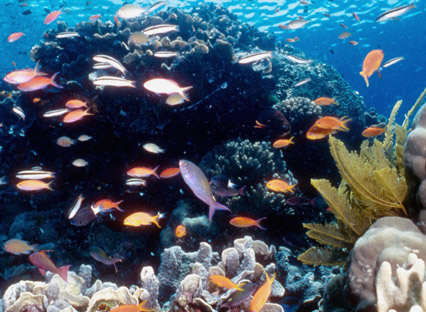Could heat-tolerant algae save coral reefs from climate change?
Scientists have ‘trained’ microalgae to tolerate higher sea temperatures

A free daily email with the biggest news stories of the day – and the best features from TheWeek.com
You are now subscribed
Your newsletter sign-up was successful
Scientists have developed heat-developed algae in a breakthrough that could help save endangered coral reeds.
The development has been revealed just months after Australia saw its third mass bleaching event in five years, amid record-high ocean temperatures at the Great Barrier Reef, as The Guardian reported at the time.
Coral bleaching occurs when rising sea temperatures cause corals to expel the colourful Symbiodiniaceae microalgae that live in their tissues and supply them with nutrients. As the algae is expelled, the corals lose their colour and starve to death.
The Week
Escape your echo chamber. Get the facts behind the news, plus analysis from multiple perspectives.

Sign up for The Week's Free Newsletters
From our morning news briefing to a weekly Good News Newsletter, get the best of The Week delivered directly to your inbox.
From our morning news briefing to a weekly Good News Newsletter, get the best of The Week delivered directly to your inbox.
But scientists at Australia’s Commonwealth Scientific and Industrial Research Organisation (CSIRO) have discovered that coral reefs could survive if the heat tolerance of their resident algae was raised, reports New Scientist.
Researchers from the national science agency and the University of Melbourne heated Symbiodiniaceae algae to 31°C in a laboratory for four years to train the organism to tolerate higher water temperatures. Over time, the algae evolved genetic changes that mean it could have greater heat resistance.
The researchers then took coral larvae from the Great Barrier Reef and mixed it with either standard algae or the heat-resistant algae before heating both blends to 31°C for one week. The coral with the “non-trained” algae quickly bleached, but the coral with the heat-resistant algae remained healthy.
Madeleine van Oppen of Melbourne University told The Times: “We found that the heat tolerant microalgae are better at photosynthesis and improve the heat response of the coral animal.
A free daily email with the biggest news stories of the day – and the best features from TheWeek.com
“These exciting findings show that the microalgae and the coral are in direct communication with each other. We’re putting all our efforts into this now in case we need it to have it ready as an intervention in the future.”
–––––––––––––––––––––––––––––––For a round-up of the most important stories from around the world - and a concise, refreshing and balanced take on the week’s news agenda - try The Week magazine. Start your trial subscription today –––––––––––––––––––––––––––––––
Sorcha Bradley is a writer at The Week and a regular on “The Week Unwrapped” podcast. She worked at The Week magazine for a year and a half before taking up her current role with the digital team, where she mostly covers UK current affairs and politics. Before joining The Week, Sorcha worked at slow-news start-up Tortoise Media. She has also written for Sky News, The Sunday Times, the London Evening Standard and Grazia magazine, among other publications. She has a master’s in newspaper journalism from City, University of London, where she specialised in political journalism.
-
 What are the best investments for beginners?
What are the best investments for beginners?The Explainer Stocks and ETFs and bonds, oh my
-
 What to know before filing your own taxes for the first time
What to know before filing your own taxes for the first timethe explainer Tackle this financial milestone with confidence
-
 The biggest box office flops of the 21st century
The biggest box office flops of the 21st centuryin depth Unnecessary remakes and turgid, expensive CGI-fests highlight this list of these most notorious box-office losers
-
 The plan to wall off the ‘Doomsday’ glacier
The plan to wall off the ‘Doomsday’ glacierUnder the Radar Massive barrier could ‘slow the rate of ice loss’ from Thwaites Glacier, whose total collapse would have devastating consequences
-
 Can the UK take any more rain?
Can the UK take any more rain?Today’s Big Question An Atlantic jet stream is ‘stuck’ over British skies, leading to ‘biblical’ downpours and more than 40 consecutive days of rain in some areas
-
 As temperatures rise, US incomes fall
As temperatures rise, US incomes fallUnder the radar Elevated temperatures are capable of affecting the entire economy
-
 The world is entering an ‘era of water bankruptcy’
The world is entering an ‘era of water bankruptcy’The explainer Water might soon be more valuable than gold
-
 Climate change could lead to a reptile ‘sexpocalypse’
Climate change could lead to a reptile ‘sexpocalypse’Under the radar The gender gap has hit the animal kingdom
-
 The former largest iceberg is turning blue. It’s a bad sign.
The former largest iceberg is turning blue. It’s a bad sign.Under the radar It is quickly melting away
-
 How drones detected a deadly threat to Arctic whales
How drones detected a deadly threat to Arctic whalesUnder the radar Monitoring the sea in the air
-
 ‘Jumping genes’: how polar bears are rewiring their DNA to survive the warming Arctic
‘Jumping genes’: how polar bears are rewiring their DNA to survive the warming ArcticUnder the radar The species is adapting to warmer temperatures